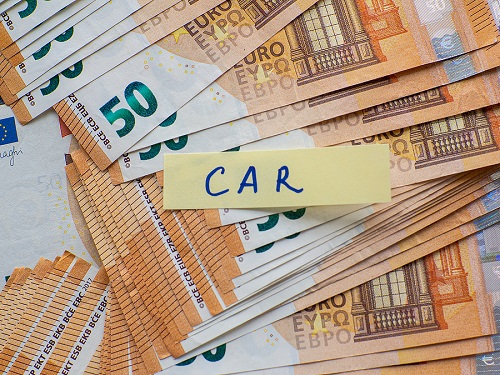How much can you bargain on a used car? The short answer is ‘lots’ but as ever, it’s a little more complicated than that.
The first thing to do is your homework. Ireland, sadly, does not have a UK-style official guide for second hand car values in the vein of the famous ‘Black Book’ so you’ll have to get studying the classified ads. Not just for the exact car you want to buy, but for other versions of the same model, and similar competitors.
By doing this, you’ll build up a useful bank of knowledge of the price of the car you want, the price of similar cars, and the price of competitors, all stratified by age, mileage, equipment, and history. This gives you your starting price.
How much should I bid at first?

Don’t go crashing in with a low-ball bid, trying to get an impossible bargain. Car traders will know what a car is worth and what they’re prepared to sell it for, and you’ll have to assume that private sellers will have done some or all of the same research you’ve done, so be sensible. Starting at asking price minus €10,000 is going to get you nowhere. What you want to bid is something around the lower end of the prices you’ve seen for similar cars. If, for argument’s sake, the average price is around €15,000, bid €12,500 or €13,000. If you get an instant handshake, well and good. If not, at least you’ve started your bidding at a sensible level.
How much profit do dealers make on used cars?
The used car market, by and large, has profit margins that are better than those for new cars. The best new cars generally generate a profit of as much as eight per cent, but are more usually closer to 2-3 per cent. Car dealers accept such narrow profit margins as they make their cash elsewhere — from servicing, parts, accessories, finance packages, and of course used cars.
Broadly speaking, used cars tend to generate around 12-15 per cent profit margin, although that will of course vary massively depending on the model. A hard-to-find specialist or luxury car might generate considerably more; a more widely available model might run a bit less profit. But if we assume a 12 per cent profit margin is the basic rate, that gives you the window in which you can pitch your bids. If the price you’re willing to pay is the asking price minus 12 per cent, then you’re asking the dealer to sell the car to you at below cost, and no-one’s going to do that.
How hard should I haggle on a used car?

Again, be sensible. You want to buy, the dealer wants to sell but both of you need to come away from the process happy. Ideally, you should be slightly the happier, of course… There’s no need to be aggressive. Once you’ve made your opening bid and (presumably) have had it rejected as being too little, make sure you have a very firm idea of what you’re prepared to pay for the car as your upper limit. Don’t give that figure away, but be 100 per cent prepared to stand up, say thanks, and walk away if the dealer won’t meet it. The power of walking, politely, away should not be underestimated and neither should a little patience. A dealer might ring you back tomorrow or the next day to say “That car you were looking at. I think we can do a deal…” Always remember that, except in exceptional circumstances, there will always be another version of the car you’re looking for which you can buy elsewhere, and potentially at a sharper price.
Aren’t used cars going up in value right now?
Yes, they are. New car sales have contracted, mostly because almost all car makers are having trouble making new cars, because of employee shortages and restricted supply of key components, such as computer chips. That has had a knock-on effect on the second hand market, as not only are there fewer used cars coming onto the market from 2020 and 2021, but many new car buyers are also shopping in the used market as they can’t get the new car they want. The combination of restricted supply and more buyers has inevitably pushed prices up. However, while supply of two-to-three year old cars has tightened, the fact is that there are some two-million cars on Irish roads, and as many as 300,000 of them change hands every year. So while prices are certainly higher, it doesn’t mean that you will only find one of the car you want to buy — remember that, as some sellers might try to convince you that you’ll not find another one elsewhere. The market is trickier to navigate at the moment, it’s true but it’s certainly not impossible.
Will I get more off if I offer to pay cash?

This would have been true some years ago, but it doesn’t play any longer. Even in the used market, dealers can make a considerable margin on the sale of finance packages, so it can actually be detrimental to say up front that you’re buying with cash. Negotiate on the basis of a finance deal, and then play your cash card at the last moment, once the price has been agreed.
Are private sellers more open to doing a deal on a used car?
In general, yes — a private buyer after all is just looking to sell one car (usually, anyway) and isn’t trying to turn a specific profit on it. Bear in mind, though, that a private seller is probably looking to use the money for their next car purchase, so they’ll be keen to make as much as they can. Equally, remember that when buying private, you’re less covered by consumer protection laws so bear that in mind.
What tactics should I use when making an offer on a used car?
As noted, the power of walking away is immense, but that’s a last-minute option. Before that, just be polite but firm. Make your offer, and then let the sales person do the work and the talking. After all, it’s their job to sell you the car, not your job to buy it. A bit of silence is a powerful tool, and don’t forget to use positive phrasing; ‘what discount are you prepared to give me?’ is a much better phrase than ‘can I have a discount?’. It puts the ball in their court, so to speak. And don’t get emotional, or upset if they don’t offer you what you want. This is a car, after all, so it’s not worth getting het up about. If you’re not getting the deal you want, just say thanks anyway, and stroll out. There are always other cars to be bought.